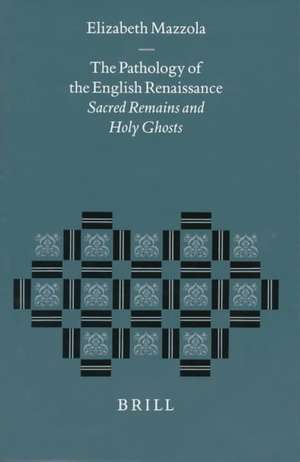The Pathology of the English Renaissance: Sacred Remains and Holy Ghosts: Studies in the History of Christian Traditions, cartea 86
Autor Elizabeth Mazzolaen Limba Engleză Hardback – 20 aug 1998
The first part of the book treats Spenser's Faerie Queene and Milton's Paradise Lost, concentrating on vacant cultural spaces and abandoned icons to trace the gap between sacred and secular life, between poetry and belief. The second part focuses on Shakespeare's Hamlet and Elizabeth Cary's Tragedy of Mariam to investigate the eschatological implications of this gap, the ways that history is disentangled from memory and nostalgia severed from experience.
The book challenges readings of Renaissance culture as an increasingly secular one, proposing that sacred symbols and practices still powerfully organized the English moral imagination, oriented behaviors and arranged perceptions, and specified the limits of the known world.
Din seria Studies in the History of Christian Traditions
- 18%
 Preț: 702.84 lei
Preț: 702.84 lei - 18%
 Preț: 818.22 lei
Preț: 818.22 lei - 15%
 Preț: 691.66 lei
Preț: 691.66 lei - 15%
 Preț: 523.05 lei
Preț: 523.05 lei - 18%
 Preț: 656.42 lei
Preț: 656.42 lei - 18%
 Preț: 1041.53 lei
Preț: 1041.53 lei - 18%
 Preț: 658.14 lei
Preț: 658.14 lei - 18%
 Preț: 658.69 lei
Preț: 658.69 lei - 18%
 Preț: 653.38 lei
Preț: 653.38 lei - 18%
 Preț: 661.03 lei
Preț: 661.03 lei - 18%
 Preț: 670.51 lei
Preț: 670.51 lei - 18%
 Preț: 658.76 lei
Preț: 658.76 lei - 18%
 Preț: 653.94 lei
Preț: 653.94 lei - 18%
 Preț: 654.18 lei
Preț: 654.18 lei - 18%
 Preț: 653.71 lei
Preț: 653.71 lei - 18%
 Preț: 653.24 lei
Preț: 653.24 lei - 18%
 Preț: 591.89 lei
Preț: 591.89 lei - 18%
 Preț: 661.09 lei
Preț: 661.09 lei - 18%
 Preț: 655.49 lei
Preț: 655.49 lei - 18%
 Preț: 660.72 lei
Preț: 660.72 lei - 18%
 Preț: 665.37 lei
Preț: 665.37 lei - 18%
 Preț: 656.83 lei
Preț: 656.83 lei - 18%
 Preț: 654.72 lei
Preț: 654.72 lei - 18%
 Preț: 656.27 lei
Preț: 656.27 lei - 18%
 Preț: 656.04 lei
Preț: 656.04 lei - 18%
 Preț: 644.98 lei
Preț: 644.98 lei - 18%
 Preț: 652.14 lei
Preț: 652.14 lei - 18%
 Preț: 669.57 lei
Preț: 669.57 lei - 18%
 Preț: 655.82 lei
Preț: 655.82 lei - 18%
 Preț: 654.02 lei
Preț: 654.02 lei - 18%
 Preț: 654.56 lei
Preț: 654.56 lei - 18%
 Preț: 658.21 lei
Preț: 658.21 lei - 18%
 Preț: 655.01 lei
Preț: 655.01 lei - 18%
 Preț: 693.26 lei
Preț: 693.26 lei - 18%
 Preț: 693.26 lei
Preț: 693.26 lei - 18%
 Preț: 1372.82 lei
Preț: 1372.82 lei - 18%
 Preț: 695.59 lei
Preț: 695.59 lei - 18%
 Preț: 693.42 lei
Preț: 693.42 lei - 18%
 Preț: 1046.22 lei
Preț: 1046.22 lei - 18%
 Preț: 690.29 lei
Preț: 690.29 lei - 18%
 Preț: 690.54 lei
Preț: 690.54 lei - 18%
 Preț: 584.62 lei
Preț: 584.62 lei - 18%
 Preț: 693.26 lei
Preț: 693.26 lei - 18%
 Preț: 1249.50 lei
Preț: 1249.50 lei - 18%
 Preț: 692.09 lei
Preț: 692.09 lei - 18%
 Preț: 693.44 lei
Preț: 693.44 lei - 18%
 Preț: 692.02 lei
Preț: 692.02 lei - 18%
 Preț: 697.15 lei
Preț: 697.15 lei - 18%
 Preț: 680.65 lei
Preț: 680.65 lei - 18%
 Preț: 892.27 lei
Preț: 892.27 lei
Preț: 510.01 lei
Preț vechi: 600.01 lei
-15% Nou
Puncte Express: 765
Preț estimativ în valută:
97.65€ • 101.68$ • 81.02£
97.65€ • 101.68$ • 81.02£
Carte indisponibilă temporar
Doresc să fiu notificat când acest titlu va fi disponibil:
Se trimite...
Preluare comenzi: 021 569.72.76
Specificații
ISBN-13: 9789004111950
ISBN-10: 9004111956
Pagini: 156
Dimensiuni: 155 x 235 x 21 mm
Greutate: 0.48 kg
Editura: Brill
Colecția Brill
Seria Studies in the History of Christian Traditions
ISBN-10: 9004111956
Pagini: 156
Dimensiuni: 155 x 235 x 21 mm
Greutate: 0.48 kg
Editura: Brill
Colecția Brill
Seria Studies in the History of Christian Traditions
Public țintă
This book will be of interest to students of Reformation culture, Renaissance literature and history, sacred poetics and historical semiotics, as well as intellectual historians, anthropologists and theologians.Notă biografică
Elizabeth Mazzola, Ph.D. (1991) in English, New York University, is Wegman Assistant Professor of English at the City College of New York. She has published many essays on Reformation poetics, and was awarded the Spenser Society's 1996 Isabel MacCaffrey Medal.
